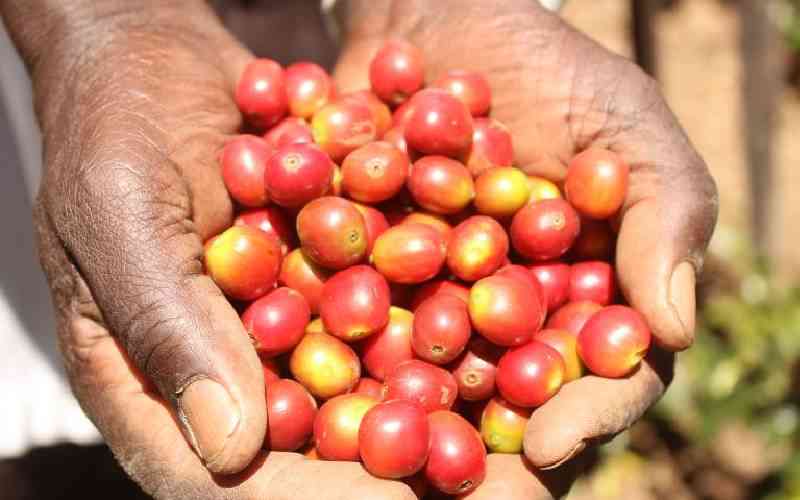 |
|
Wakulima House owned by KPCU. In October 2009, the miller was placed under receivership by KCB over Sh644 million debt [PHOTO: FILE /STANDARD] |
NAIROBI, KENYA: A decade ago, the Kenya Planters Cooperative Union (KPCU) stood tall. It was the pride of Kenya’s coffee industry. But in four years, the coffee miller has become a shadow of its former self. It was put under receivership over over Sh644 million debt, sending most farmers into oblivion.
The 77-year-old farmers’ organisation is planning to re-enter the coffee marketing business, now in the hands of multi-national coffee firms. Last week, KPCU said Kenya Commercial Bank (KCB) had lifted its receivership after the two agreed on a new debt repayment schedule. But even before it starts operations, a new row has erupted, now, between current directors and the Ministry of Industrialisation and Enterprise Development where cooperatives fall. The Government, through the department of Cooperatives, wants the directors to seek fresh mandate from the members during countrywide elections to be held later this month.
However, the directors elected in July 2012 as caretaker team, say farmers renewed their mandate for another three years during an Annual General Meeting held at Dandora coffee mills mid last year. The board insists it will roll out an ambitious marketing plan that will involve capping of coffee prices. It will also modernise buildings in Nairobi and other regions to attract high rent. Last month the KPCU matter took a new twist when the Commissioner of Cooperatives Patrick Musyimi issued a notice calling for countrywide elections of 15 directors on July 31, 2014. Musyimi insists that the term of the current directors expires in July 2014.
“Kindly note that the term of office of the current interim directors expires in July 2014. Note further that the grassroots elections of directors were last held on June 28, 2006. It has therefore become prudent for the directors to seek fresh mandate from the members as part of the union’s revival strategies,” said Mr Musysimi in a notice sent to county cooperative commissioners where coffee is grown.
The directors have hit back by issuing a notice for a special general meeting to be held two days before the scheduled elections. “We were given a three year mandate last year by the farmers. Further, the government has not communicated to us formally over the issue,” said Board chairman William Gatei. During the special meeting, farmers will be asked for confirmation and endorsement of an amendment to the Memorandum and Articles of Association.The members are also expected to approve the sale of non-core assets and lease, for, example, two buildings in Nairobi.
Modernisation
A source within KPCU said the board wants members to amend the Memorandum and Articles of Association to cap the number of directors to 10 instead of a board of 15 as government demands. This is based on a report sponsored by the European Union which recommends the number of directors be reduced to less than 10 and subsidiaries companies formed to manage various functions such as marketing, milling, and production. “In the coming weeks we will start modernisation of the buildings so that they can be leased as per the current rates in the market,” he said. The buildings include Wakulima House which consists of four parts; Wakuliam House itself, the old coffee mill, Ghala and R&K building.
Sources also claim that there are plans by the directors to change ownership structure to create space for the new investors who have injected Sh100 million. It is rumored that a prominent city businessman wanted to buy 18 per cent stake in the miller, but the idea was turned down as it was feared it would cause disquiet among coffee stakeholders. However, Gatei denied the claims saying no single asset will be sold to a non-shareholder. The non-core assets being targeted for sale include warehouses in Kisumu, Nakuru and Nanyuki, three acres of land in Kisii, and other parcels of land located in Kiambu and Muranga. Also the union owns coffee mills located in Nairobi, Kirinyaga, Meru and Kisii counties.
The institution was in active coffee trade until October 2009 when it was placed under receivership over Sh644 million debt by Kenya Commercial Bank (KCB) and Deloitte & Touche consulting firm. Last year, the two organisations agreed to have the receivership lifted, but the deal flopped after KPCU directors failed to raise an initial amount of Sh100 million. Last month, the two, again agreed on new payment conditions after KPCU paid the Sh100 million. Gatei disclosed that the funds were mobilised from a consortium of local investors who have already paid Sh100 million. The balance is to be paid interest-free over a 10-year period, according to an agreement with KCB.
“We have effectively negotiated with the bank to allow us spread the repayment period,” said Mr Gatei adding that the lifting of the receivership will be announced by President Uhuru Kenyatta sometimes next week.
Better returns
“President Kenyatta assisted us a lot in the negotiation and Labour Cabinet Secretary Kazungu Kambi has been helpful. He has promised to make a public announcement soon,” Gatei said. However, players have questioned why the cabinet secretary in charge of cooperatives Adan Mohamed was not involved in the negotiation. When contacted by this writer last week, Mr Mohamed declined to comment. State house offered no further comment when we contacted. The problems bedeviling the institution can be traced to liberalisation of the coffee industry in 1990s, which saw the entry of many players. There was also a sharp decline in coffee production which today stand at less than 50,000 metric tonnes compared to 130,000 recorded in 1987/88. Before insolvency, KPCU had more than 100 court cases in local courts that complicated its revival bid. The union has been grappling with debts of more than Sh5 billion.
The board now says it will restructure and implement a new business model that offers farmers better returns through a more prudent price discovery. But, still owing to the miller’s credibility questions, it will have to do more to regain farmers who have since moved to other millers. Also, most coffee growing counties have established coffee mills and marketing institutions promising to link framers directly with international buyers. This complicates KPCU’s re-entry game plan.
 The Standard Group Plc is a
multi-media organization with investments in media platforms spanning newspaper
print operations, television, radio broadcasting, digital and online services. The
Standard Group is recognized as a leading multi-media house in Kenya with a key
influence in matters of national and international interest.
The Standard Group Plc is a
multi-media organization with investments in media platforms spanning newspaper
print operations, television, radio broadcasting, digital and online services. The
Standard Group is recognized as a leading multi-media house in Kenya with a key
influence in matters of national and international interest.
 The Standard Group Plc is a
multi-media organization with investments in media platforms spanning newspaper
print operations, television, radio broadcasting, digital and online services. The
Standard Group is recognized as a leading multi-media house in Kenya with a key
influence in matters of national and international interest.
The Standard Group Plc is a
multi-media organization with investments in media platforms spanning newspaper
print operations, television, radio broadcasting, digital and online services. The
Standard Group is recognized as a leading multi-media house in Kenya with a key
influence in matters of national and international interest.










